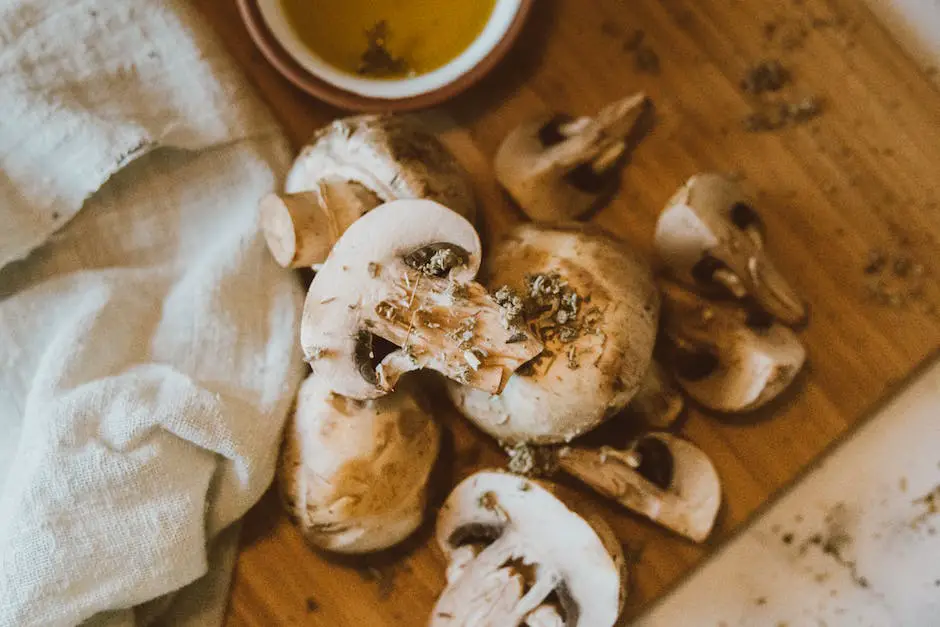- Mushroom Fertility Benefits
- Antioxidant Properties of Mushrooms and Reproductive Health
- Specific Mushrooms Known for Fertility Benefits
- Mushroom Fertility Benefits
- How to Incorporating Mushrooms in Your Diet
- How to Prepare Mushrooms to Boost Fertility
- Fertility-Boosting Properties of Mushrooms
- Potential Risks and Precautions
- Final thought
While some people may simply appreciate mushrooms for their savory taste, others value them for their potential health perks. Of particular interest are the potential fertility benefits of certain species of mushrooms. There is growing evidence from various scientific research studies suggesting that certain types of mushrooms, such as Cordyceps, Reishi, and Lion’s Mane, may have a remarkable impact in enhancing reproductive health and potentially aiding fertility in both males and females. However, like all-natural remedies, these come with a set of guidelines and precautions to ensure optimal benefits.
Mushroom Fertility Benefits
In recent years, various scientific studies have suggested that certain mushrooms can have a positive impact on reproductive health, potentially enhancing fertility in both males and females. Mushrooms are rich in vitamins, minerals, and antioxidants, which are all beneficial to overall health and well-being.
Male Fertility and Mushrooms
For male fertility, specific types of mushrooms can directly impact sperm health. Certain mushrooms, such as Cordyceps and Reishi, have been studied for their potential role in improving sperm quality and motility. Cordycepin, a component found in Cordyceps, has been noted for its ability to protect sperm from oxidative stress, which can negatively affect sperm quality. Similarly, research indicates that the polysaccharides and triterpenes in Reishi mushrooms can also help enhance sperm activity and protect them from oxidative damage.
Mushroom and Female Fertility
On the female fertility side, shiitake mushrooms, maitake mushrooms, enokitake mushrooms, and turkey tail mushrooms are particularly noteworthy. These types of mushrooms are rich in beta-glucans, a type of dietary fiber that may play an important role in regulating the immune system. A well-regulated immune system is vital for a healthy pregnancy, as it can aid in embryo implantation and prevent early miscarriage.
Shiitake mushrooms, in particular, also contain significant amounts of B vitamins and other important nutrients that can foster a healthy reproductive environment. Similarly, research suggests that D-fractions found in Maitake mushrooms may help balance hormones, which is critical for ovulation and regular menstrual cycles.
Antioxidant Properties of Mushrooms and Reproductive Health
Mushrooms are also known to have strong antioxidant properties, helping to combat free radicals in the body, which can damage cells and cause inflammation. This benefit of mushrooms is not limited to a specific type, as most mushroom types contain substantial amounts of antioxidants. Free radicals and oxidative stress can contribute to conditions like endometriosis and polycystic ovary syndrome (PCOS), which are known to negatively affect female fertility. Consequently, the antioxidant effects of mushrooms could potentially help to combat these conditions and improve fertility.
Bottom line
Existing research indicates a potential link between the consumption of mushrooms and enhanced fertility in both males and females. This can be attributed to the beneficial compounds present in these fungi. However, it is crucial to conduct more studies to comprehensively understand the association between fertility and mushrooms, including any possible side effects or contraindications. Meanwhile, incorporating mushrooms into a diet generally promotes overall wellness, which in turn can positively affect reproductive health.

Specific Mushrooms Known for Fertility Benefits
- Cordyceps
- Reishi
- Lion’s Mane
Cordyceps: A Mushroom with Potential Fertility Benefits
Renowned for its medicinal properties, Cordyceps, a type of mushroom, has long been used in traditional Chinese medicine with a particular emphasis on enhancing fertility. It is believed to fortify libido and optimize sexual function, thereby paving the way for successful conception. The positive impacts of cordyceps on fertility may be tied to its capacity to boost testosterone levels, control sperm production, improve blood circulation, and combat fatigue.
These claims are corroborated by various research studies. To illustrate, a study published in the Journal of Dietary Supplements in 2016 suggests that cordyceps can elevate testosterone production in mice. Additionally, research from the Life Sciences journal in 2004 revealed that cordyceps could offer benefits to patients whose sperm has been adversely affected by age or disease.
Reishi and Fertility Benefits
Reishi mushrooms, another species well-regarded in traditional medicine, are also believed to be beneficial for fertility. They’re known for their potential to help balance hormones and reduce stress, both of which are essential in boosting fertility. Additionally, its antioxidant properties aid in improving overall health, which is important for maintaining fertility.
Research studies provide some support for the fertility benefits of reishi mushrooms. A 2012 study published in the Journal of Ethnopharmacology suggests that reishi could protect the body from the oxidative stress that can influence fertility. Furthermore, a 2013 animal study published in the Journal of Medicinal Food found that reishi could potentially improve sperm activity.
Lion’s Mane and Fertility Benefits
Lion’s Mane is another type of mushroom that’s thought to offer fertility benefits. It’s well-known for its positive effects on cognitive health and nerve growth factor (NGF) production, which are significant in fertility as they may enhance overall brain health, mood, and stress levels.
Although there isn’t as much research directly linking Lion’s Mane to fertility benefits, some studies indicate its potential indirect impact. For instance, a 2012 study from the Journal of Agricultural and Food Chemistry found that a Lion’s Mane can stimulate NGF production, which may, in turn, reduce depression and anxiety, two conditions often associated with fertility issues.
Before exploring the fertility benefits of mushrooms, it’s important to note that while several studies support these benefits, more in-depth, human-centric studies and clinical trials are necessary. It is also strongly recommended that you consult with a healthcare provider before beginning any supplement regimen to boost fertility.

Mushroom Fertility Benefits
Celebrated for their high nutritional value, mushrooms have been recognized for their potential to enhance fertility. Their potent cocktail of antioxidants and nutrients is likely the key to their beneficial effects. Notably, Cordyceps, Reishi, and Shiitake mushrooms have a long history of use in traditional medicine, reputed to bolster immune health, energize the body, and boost fertility.
The high selenium content of mushrooms, a mineral crucial for the optimal functioning of the reproductive systems in men and women alike, is worthy of mention. Moreover, they are rich in vitamin D and folate — nutrients integral to the production of healthy sperm and the prevention of birth defects during pregnancy.
Furthermore, mushrooms offer an abundant dietary source of antioxidants, such as Beta-glucans, which neutralize the oxidative stress that may negatively influence the quality of both sperm and eggs. In particular, Himematsutake and Shiitake mushrooms are renowned for their polysaccharides, a class of carbohydrates that can fortify immune health, a quality that bodes well for the integrity of sperm.
How to Incorporating Mushrooms in Your Diet
Infusing these beneficial mushrooms into your diet can be a creative and flavorful experience. There are numerous methods for preparing mushrooms to maximize their nutritional value and make them a tasteful addition to your meals.
A simple yet delicious way to prepare mushrooms is to sauté them in olive oil or grass-fed butter. This method can preserve their antioxidant properties and enhance their flavor. They can then be sprinkled with herbs and spices or added to pasta, salads, stir-fries, and soups.
Alternatively, they can be incorporated into your diet through mushroom supplements available in the market, but be sure to choose a reputable supplement brand for the highest quality. In addition to this, teas and broths made from mushrooms are increasingly becoming popular, offering a soothing way to consume these fertility-promoting fungi.
How to Prepare Mushrooms to Boost Fertility
Cooking mushrooms properly is crucial as it doesn’t only elevate their flavor but also maximizes their potential nutritional value. To maintain the richness of the nutrients, mushrooms are best cooked under moderate to low heat preventing the risk of burning and nutrient loss. Complementing mushrooms with antioxidant-packed vegetables such as spinach, broccoli, and red bell peppers augments the fertility-boosting benefits of your diet.
Additionally, to amass all the healthful advantages that mushrooms offer, it is recommended to incorporate various types into your meals. This includes Maitake, Reishi, Shiitake, and Cordyceps mushrooms, each with their unique nutritional profile and health-boosting properties.

Fertility-Boosting Properties of Mushrooms
Certain mushrooms, predominantly edible medicinal varieties, have been acknowledged worldwide for aiding various aspects of human health. These include enhancing immunity, supporting cardiovascular health, and even having anti-cancer properties. Emerging research indicates that certain mushrooms could have fertility-enhancing properties as well. One such mushroom is Cordyceps. Commonly consumed as a supplement, these small fungi native to high-altitude areas of China are traditionally used in Chinese medicine to improve kidney function, enhance energy levels, and augment sexual function. Several animal-based studies propose that Cordyceps might increase testosterone levels and enhance sperm quality, important factors for male fertility.
Shiitake mushrooms, another variety, have also been linked to fertility benefits. These mushrooms are abundant in antioxidants, aiding in preventing cell damage and promoting overall health. They are also a rich source of Selenium, a key mineral for the production of sperm and protecting sperm DNA from damage.
Potential Risks and Precautions
While generally safe for consumption, consuming medicinal mushrooms as supplements does come with potential risks and side effects. Some people have reported experiencing mild side effects like digestive upset, diarrhea, or dry mouth from consuming Cordyceps. Also, because Cordyceps can affect the immune system, individuals with autoimmune diseases should be cautious. In the case of Shiitake mushrooms, frequent and excess consumption may lead to hypersensitivity reactions, causing skin rashes in some individuals.
Moreover, due to the lack of comprehensive research on these and other types of edible medicinal mushrooms, it is recommended for pregnant and lactating women to avoid consuming unnecessarily large amounts of these mushrooms unless instructed by a healthcare provider. This also applies to those planning to conceive.
Furthermore, it is essential to source these supplements from reputable manufacturers, as poorly sourced supplements may not only be ineffective but could also contain harmful substances.
Final thought
Incorporating mushrooms into a daily diet can be beneficial due to their antioxidant, vitamin, and mineral content, including potential fertility benefits. However, it is always recommended to consult with a healthcare professional before making substantial dietary changes or beginning a new supplement regimen. Always stay informed and make safe choices regarding your health.

While it’s fascinating to learn about the potential fertility benefits of certain mushroom types, it’s crucial to be aware of the precautions that need to be taken. Not every mushroom type is suitable for everyone and consuming them in excess can lead to potential side effects. As always, any significant changes to one’s diet or use of supplements should be discussed with a healthcare professional before implementation. Remember, mushrooms can only serve as a component of a wholesome diet and lifestyle aimed at improving fertility and overall health. And for sure, among vegetables, they are one category that brings more than just flavor to the table.
Discover more from Fertilitylens
Subscribe to get the latest posts sent to your email.










